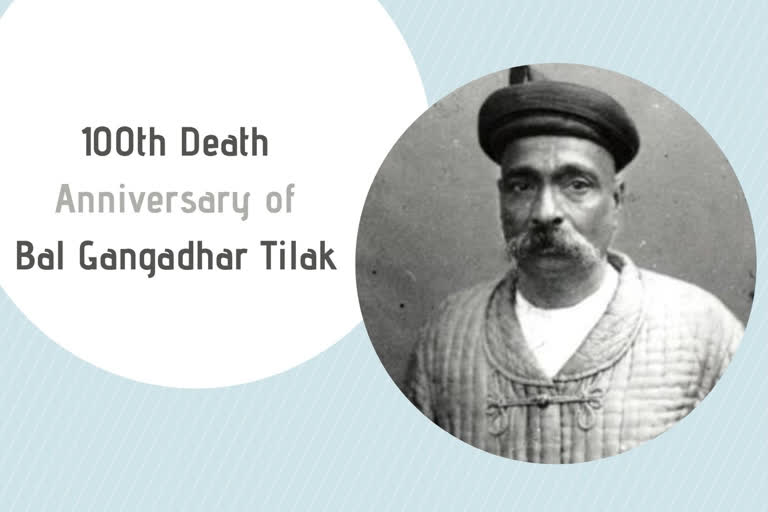Hyderabad: August 1, 2020 marks the 100th death anniversary of Bal Gangadhar Tilak, one of the icons of India's freedom struggle, who has become synonymous with his idea of Swaraj.
Bal Gangadhar Tilak was born into a middle class family in Ratnagiri in 1856. After completing law from the University of Bombay (now Mumbai), he decided to teach mathematics at a private school in Poona from where his political career began.
Tilak, who joined the Congress in 1890, was opposed to moderate ways and views and had a more radical and aggressive stance against British rule.
He was one of the first advocates of Swaraj or self-rule. He gave the slogan, "Swaraj is my birthright and I shall have it." He believed that no progress was possible without self-rule.
He started awakening people through newspapers like 'Kesari' in Marathi and 'The Mahratta' in English. He was fearless in his criticism of the government in these papers.
The political goal of Bal Gangadhar Tilak was to attain Swaraj or self government for the people of India. Tilak was the most significant and dominant political personality of the early years of the 20 century who gave to the people of the country the first lesson in the form of the consciousness of the right of Swaraj are home Rule.
'Swaraj is my birthright and I shall have it'
At the Lucknow session of the Indian National Congress 1916 Tilak declared: 'Swaraj is the birth right of the Indians.' To Tilak, Swaraj meant Home Rule or self-government for the people of India. Usually Swaraj is translated to mean 'self-rule' or independence for foreign political domination.
Tilak insisted that in the absence of Swaraj, our life and our Dharma were is vain. Without Swaraj life was not worthwhile. Tilak was not very keen on securing government jobs for deserving India.
Read: What the youth needs to know about Gandhiji’s idea of Independence
In his own words, "To get posts of big salaries is not the meaning of Swarajya." 'Swaraj' to him meant a total change in political theory. He wanted complete swaraj. According to him, swaraj under Dharmarajya either existed fully or did not exit at all. For the Indian people, there could be no such thing as partial swaraj.
This was the essence of his statement when he declared, "Swaraj is my birth right and I shall have it." During Bengal partition Tilak formulated four paint programmes life Swadeshi, Boycott ,National education, and Passive Resistance for swaraj.
Ganesh Chaturthi to promote unity, collective spirit
Tilak also called for people to be proud of their heritage, and was against the blatant westernisation of society. He used the Ganesh Chaturthi and Shiv Jayanti (birth anniversary of Shivaji), to create unity and a national spirit among the people. He transformed the simple Ganesh Puja performed at home into a social and public Ganesh festival, which till date remains one of the biggest festivals of Maharashtra.
Freedom of press
Tilak held the view that the press had the right to criticise the bureaucracy, and it was the duty of the newspapers to place before the government the grievances of the people. As Tilak's attacks become more and more fierce, the bureaucracy started persecuting and prosecuting him. However, Tilak was relentless and continued with his virulent attacks.
Read: Gandhi’s Satyagraha came from his 'experiment with truth'
Tilak used to say, "We have not started the papers for winning the favour of government. We shall not be sorry for its displeasure, because of our criticism of policy. Nor will we hesitate to suffer the consequences of that displeasure. If the repressive policy of the government is not to be protested against and if we are not to tell the people that the folly of the administration will cause them suffering and that all such acts of the government will not be in the interests of all the government itself, why then have any paper at all?"
"Our views and the way in which they are expressed may sound harsh, but that is so because of the way of our thinking when the heart burns under protest against disgusting wrong and gross injustice, that fire will naturally be reflected in the writing and expressions of the writer."



